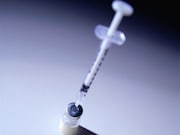Adolescents whose parents watched the video were three times more likely to be vaccinated
FRIDAY, Feb. 1, 2019 (HealthDay News) — Educational videos in pediatric clinics can increase rates of human papillomavirus (HPV) vaccination among adolescents, according to a study published in the January issue of Pediatrics.
Brian E. Dixon, Ph.D., from Indiana University in Indianapolis, and colleagues conducted a cluster randomized trial in which an intervention was used to target parents of adolescents, aged 11 to 17 years, who were eligible for a dose of the HPV vaccine. Parents in the intervention group used a tablet in the examination room to watch a digital video that outlined the risks and benefits of the vaccine. The intervention was tested in pediatric clinics that were part of an urban health system.
The researchers found that one-third of adolescents visited an intervention clinic and were significantly more likely to be younger (11 to 12 years of age) than those who attended a control clinic (72.4 versus 49.8 percent). The proportion of adolescents with a change in vaccine status was higher for those seen in an intervention clinic versus those seen in a control clinic (64.8 versus 50.1 percent; odds ratio, 1.82). Adolescents whose parents watched the video were three times more likely to receive a dose of the HPV vaccine (78 percent; odds ratio, 3.07).
“Educational interventions delivered within a clinical setting hold promise to improve vaccination behaviors,” the authors write.
Two authors disclosed financial ties to pharmaceutical companies, including Merck, which funded the study.
Copyright © 2019 HealthDay. All rights reserved.








